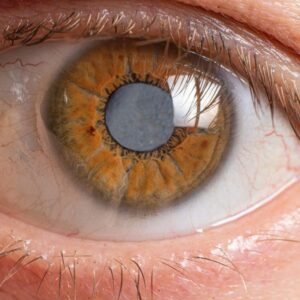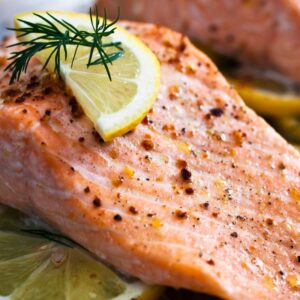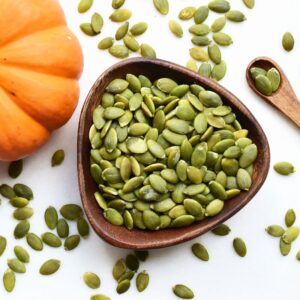Nutrition for Eye Health
August 15, 2023
By Romana Brennan, MS, RD
 Nutrition for Eye Health — Common Eye Conditions: Eyesight is an aspect of health that is often not thought about until problems arise. Thankfully, a variety of these eye-related issues can be treated, slowed or prevented.
Nutrition for Eye Health — Common Eye Conditions: Eyesight is an aspect of health that is often not thought about until problems arise. Thankfully, a variety of these eye-related issues can be treated, slowed or prevented.
Some common eye conditions include (1):

- Cataracts, a clouding of the lens of the eye, which can be age-related
- Diabetic retinopathy, associated with diabetes, developing when high blood sugar levels damage the blood vessels in the retina of the eye
- Glaucoma, a condition that damages the optic nerve, which transfers visual information from eyes to the brain
- Macular degeneration, a condition that causes the cells in the central part of the eye to break down, which can be age-related.
 Tips to Improve Eye Health
Tips to Improve Eye Health
- Protect your eyes from harmful ultraviolet (UV) rays by wearing sunglasses with 99% or 100% UVA and UVB protection. Too much UV exposure can increase your risk of developing cataracts and macular degeneration.
- Regular exercise can help manage chronic conditions that may negatively affect eye health, such as diabetes, high blood pressure, and high cholesterol.
- Practice the 20-20-20 rule when using computers, phones, or tablets for extended periods of time. Rest your eyes every 20 minutes by looking 20 feet away for 20 seconds. Too much time looking at screens can lead to eye strain, blurry vision, trouble focusing at a distance, dry eyes, headaches, as well as neck, back, and shoulder pain (1).
Nutrition for Eye Health
 Maintaining a healthy diet is important for all aspects of health, eye health especially. The following nutrients have been shown to be especially beneficial for eye health by helping to maintain proper eye function, protecting your eyes against harmful UV light, and reducing the development and progression of age-related degenerative eye conditions.
Maintaining a healthy diet is important for all aspects of health, eye health especially. The following nutrients have been shown to be especially beneficial for eye health by helping to maintain proper eye function, protecting your eyes against harmful UV light, and reducing the development and progression of age-related degenerative eye conditions.
Essential Fatty Acids
Omega-3 fatty acids are crucial for the development and function of our eyes, considering the retina of the high is made up of high amounts of omega-3 unsaturated fatty acids. Omega-3s can also help reduce inflammation, enhance tear production, and support the structure of the eye (2). Check out our blog post to learn more about the best food sources of omega-3 fatty acids.
Vitamin A
Vitamin A is essential for maintaining the health of our photoreceptors, or the cells in our eyes responsible for sensing light. Vitamin A in its active form is found in animal-derived foods such as liver, egg yolks, and dairy products. On the other hand, provitamin A compounds, such as carotenoids, are found in a variety of fruits and vegetables (such as kale, spinach, carrots, orange bell peppers, cantaloupe, watermelon) and can be converted into vitamin A in the body (3).
Vitamin C
Vitamin C may help lower the risk of developing cataracts, and when combined with other nutrients listed here, may help slow the progression of age-related macular degeneration (2). The liquid that fills the outermost part of the eye has a higher concentration of vitamin C compared to any other body fluid, and these levels are directly proportional to the amount of vitamin C consumed in the diet (4). Citrus fruits, strawberries, papaya, green peppers, and tomatoes are all great sources of vitamin C.
Vitamin E
Vitamin E is an antioxidant and key nutrient for optimal eye health that helps protect the fatty acids in the eyes from harmful oxidation, or break down. Dietary sources of vitamin E include nuts and seeds, such as almonds and sunflower seeds, as well as sweet potatoes, wheat germ, and flaxseed oil (2, 5).
 Zinc
Zinc
Not only do the eyes contain high levels of zinc, but zinc is part of many enzymes that function as antioxidants and plays an important role in bringing vitamin A from the liver to the retina of the eyes to help form photoreceptors (2). Food sources of zinc include red meat, oysters, shellfish, nuts and seeds, especially pumpkin seeds (2, 6).
Lutein & Zeaxanthin
Lutein and zeaxanthin are antioxidants that are part of the provitamin A carotenoid family that function to protect the eyes against harmful blue light, and have been shown to help lower the risk for developing new cataracts and may help lower one’s risk of macular degeneration (2, 7, 8). Lutein and zeaxanthin often occur together in foods, with some of the best sources being dark green leafy vegetables, such as spinach, Swiss chard, kale, and parsley, in addition to pistachios, green peas, broccoli, sweet corn, and tangerines (2). It is worth noting that these nutrients are best absorbed when eaten alongside a fat source, so be sure to pair with a healthy fat such as avocado or cold-pressed extra virgin olive oil.

Romana Brennan, MS, RD, is a Dietitian Nutritionist at PPMA and is board certified by the Commission on Dietetic Registration as a Registered Dietitian Nutritionist. Romana received her Bachelor’s Degree in Integrative Biology, with a minor in Spanish from the University of California, Berkeley. She holds her Master’s Degree in Nutrition, Healthspan, and Longevity from the University of Southern California. Here she also completed her dietetic supervised practice, training under Registered Dietitians in a variety of inpatient, outpatient, community, research, and private practice settings.
Schedule a FREE consultation with a nutritionist today! Call (949) 566-8179 or contact us.


 Tips to Improve Eye Health
Tips to Improve Eye Health Zinc
Zinc